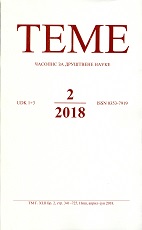Relation between “Civil” and “Inclusive” Society from a Theoretical Perspective
Relation between “Civil” and “Inclusive” Society from a Theoretical Perspective
Author(s): Jovana ŠkoricSubject(s): Civil Society
Published by: Универзитет у Нишу
Keywords: Civil society; CSOs; inclusive society; social inclusion
Summary/Abstract: The past few decades offer the evidence of the expansion of civil society organizations arising from the inability of states to, due to political or administrative constraints, cover the whole spectrum of citizens’ needs. In view of this, the paper will elaborate on the main theoretical perspectives of the concepts of “civil” and “inclusive” society, as well as the significance of civil society organizations for the social development, democratic values and an inclusive society. The introductory part of paper shows a brief overview of the history of the concept of civil society. On the one hand, it will present the main postulates of neo-liberal pluralist paradigm and contextualization of civil society by Jürgen Habermas, Robert Putnam, Francis Fukuyama and Jeffrey Alexander and on the other side we are going to consider Gramsci’s paradigm and its importance in this context. In addition, paper will present the modern conceptualization and possible perspectives of civil society organizations which will be followed by the operationalization of the concept of an inclusive society and the importance of social inclusion in this context. The last and concluding chapter is devoted to the criticism of the civil society (organizations) and challenges faced by CSOs in the social inclusion politics.
Journal: Teme - Časopis za Društvene Nauke
- Issue Year: XLII/2018
- Issue No: 2
- Page Range: 695-708
- Page Count: 14
- Language: English

